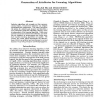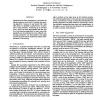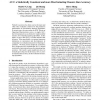116
click to vote
AAAI
1993
15 years 3 months ago
1993
This paper analyzes the complexity of on-line reinforcement learning algorithms, namely asynchronous realtime versions of Q-learning and value-iteration, applied to the problem of...
AAAI
1996
15 years 3 months ago
1996
Inductive algorithms rely strongly on their representational biases, Constructive induction can mitigate representational inadequacies. This paper introduces the notion of a relat...
101
click to vote
IJCAI
1997
15 years 3 months ago
1997
Windowing has been proposed as a procedure for efficient memory use in the ID3 decision tree learning algorithm. However, it was shown that it may often lead to a decrease in perf...
108
click to vote
NIPS
2003
15 years 3 months ago
2003
We present a family of margin based online learning algorithms for various prediction tasks. In particular we derive and analyze algorithms for binary and multiclass categorizatio...
95
Voted
NIPS
2003
15 years 3 months ago
2003
We address in this paper the question of how the knowledge of the marginal distribution P(x) can be incorporated in a learning algorithm. We suggest three theoretical methods for ...
102
click to vote
IJCAI
2003
15 years 3 months ago
2003
Predictive accuracy has been used as the main and often only evaluation criterion for the predictive performance of classification learning algorithms. In recent years, the area ...
129
Voted
IJCAI
2003
15 years 3 months ago
2003
With the growing use of distributed information networks, there is an increasing need for algorithmic and system solutions for data-driven knowledge acquisition using distributed,...
102
click to vote
NIPS
2004
15 years 3 months ago
2004
We propose a new set of criteria for learning algorithms in multi-agent systems, one that is more stringent and (we argue) better justified than previous proposed criteria. Our cr...
102
Voted
FLAIRS
2001
15 years 3 months ago
2001
When constructing a Bayesian network, it can be advantageous to employ structural learning algorithms to combine knowledge captured in databases with prior information provided by...
116
Voted
ADCS
2004
15 years 3 months ago
2004
In this paper we study the effectiveness of using a phrase-based representation in e-mail classification, and the affect this approach has on a number of machine learning algorithm...



